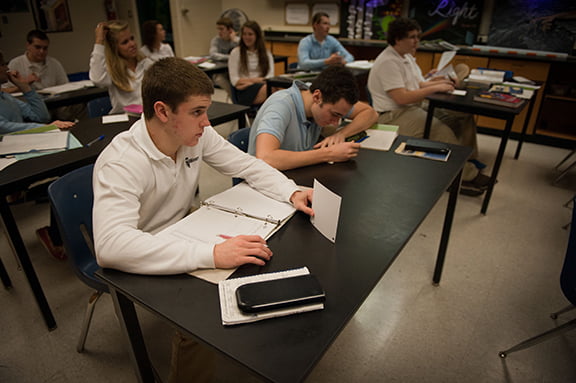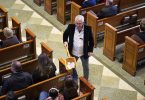 by Joe Bollig
by Joe Bollig
joe.bollig@theleaven.org
TOPEKA — The Kansas Catholic Conference saw success with legislation it supported during the 2013 legislative session, particularly with pro-life bills and the issue of religious liberty.
Other issues tracked by the conference this year included immigration, pornography, school choice and the death penalty.
Potentially, some issues could be revisited during the cleanup of the veto session, which begins May 8.
Religious freedom
On April 10, Gov. Sam Brownback signed HB 2203, also known as the Kansas Preservation of Religious Freedom Act.
The law, which takes effect in July, “provides that the government shall not substantially burden a person’s civil right to exercise religion, even if the burden results from rule of general applicability, unless the government demonstrates . . . a compelling governmental interest . . . and is the least restrictive means of furthering that . . . interest.”
“[This legislation] would only apply to the actions of the state and local governments of Kansas,” said Michael Schuttloffel, executive director of the Kansas Catholic Conference. “We obviously can’t pass something that affects the federal government through the state Legislature. But, nevertheless, this is an important step.”
“The main thrust of the legislation is to protect people from government coercion that would violate their religious freedom,” he continued. “A perfect example of such coercion is the Health and Human Services mandate, where Catholic employers would be required to provide employees with health plans that cover products and services that violate Catholic teaching.”
Pro-life issues
There were five major pro-life bills introduced this year, two of which were combined into one. All four were passed and have been signed into law, are awaiting signature, or are under review.
Kathy Ostrowski, legislative director for Kansans for Life, attributed pro-life success to an end of a political disconnect between the Capitol and the state.
“[These] successes reflect the mind of Kansas citizens,” she said. “It’s just that there had been a stumbling block in the Senate for many years. After the elections, both chambers have [pro-life] super majorities.”
Pro-life bills get a fair hearing in committees and the public gets opportunities to hear about them, thanks to the pro-life majorities, she added.
Additionally, a pro-life governor who is willing to sign pro-life bills now occupies the executive branch.
The four bills are:
• SB 142, the Civil Rights for the Unborn bill, would bar “wrongful birth or wrongful life” lawsuits for the birth of disabled children. The governor signed it on April 10.
• HB 2253/SB 141, the Pro-life Protection Act, prohibits abortions for gender selection, revised the general and late-term abortion statutes, and declares that the life of each human being begins at fertilization. It also deals with informed consent materials given to patents and prohibits tax breaks for abortion providers. The governor signed it on April 19.
• SB 199 requires the University of Kansas Medical Center to establish the Midwest Stem Cell Therapy Center. This is to encourage research for medical treatments derived from so-called umbilical cord blood and “adult” stem cells. It was sent to the governor April 12 and is under review.
• HB 2164 deals with prospective jurors and grand juries. While not explicitly a piece of pro-life legislation, it protects citizen-petitioned grand juries from being undermined by local district attorneys. The citizen-petitioned grand jury has been used by pro-life activists to challenge governmental agencies. The governor signed it on April 16.
Additionally, the Legislature passed SCR 1606, which recognizes the work of pregnancy maintenance centers. It was presented to the Kansas secretary of state on April 4.
Immigration and tuition
A bill — HB 2192 — that would have denied in-state college tuition rates to undocumented immigrants at state colleges failed to generate enough support to get out of committee, but could be acted upon next year.
Those who would be affected by the bill are the children of undocumented immigrants, who had been brought to the United States by their parents as children and grew up in this country. Current state policy allows them to pay in-state tuition.
On March 20, during a hearing before the House Federal and State Affairs Committee, the Catholic bishops of Kansas testified to their opposition to HB 2192.
The bill could move forward in two ways, said Melinda Lewis, public policy consultant for El Centro, Inc., of Kansas City, Kan. The first would be a procedural move to pull the bill from the committee to the floor of the Kansas House, and the second would be to make it an amendment to the budget in either the House or the Senate.
“We continue to hope that Catholics who share our commitment to education for immigrant students will continue to communicate with their legislators about the importance of maintaining the current policy, especially members of the Senate who need to be on guard for an amendment threat during the veto session,” said Lewis.
Even if the bill fails this year, it could be resurrected next year.
“It’s important for people to understand that we have a two-year legislative cycle,” said Lewis. “Legislation doesn’t die until the end of that two-year cycle. HB 2192 won’t die until the end of around May 2014.”
Lewis found that there was surprising and unexpected support for these youths, and hoped it would grow.
Other legislation
The Kansas Catholic Conference spoke out in support of HB 2054, the Community Defense Act. This bill would have regulated sexually-oriented businesses — strip clubs, adult bookstores, and others. It died in the House Federal and State Affairs Committee.
A school choice bill, SB 22, was voted down in the Kansas House 63 to 56. This bill, supported by the conference, would have given vouchers to children from low-income families or with special needs to enable them to attend private schools.
There have been a number of attempts to repeal capital punishment in Kansas, which was reinstated in 1994. Two bills were introduced to do so this year, HB 2397 and SB 126. Neither moved out of committee. The conference supported these bills.






